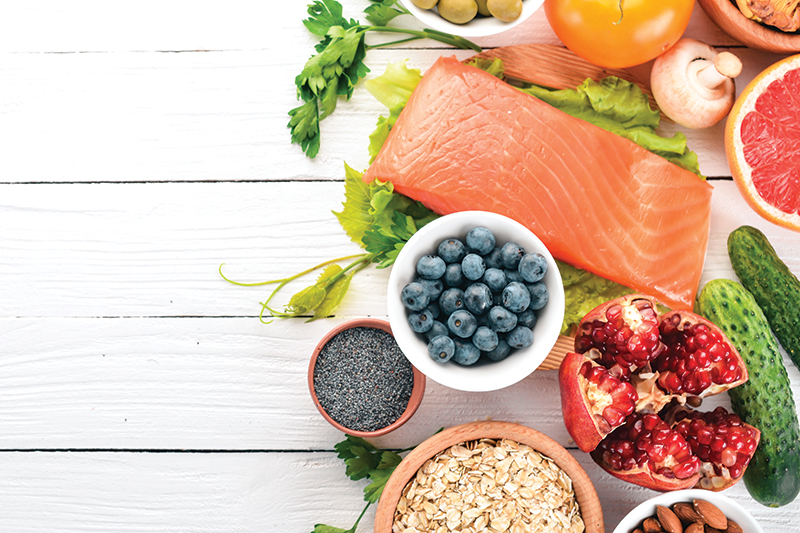Irregular menstrual cycles of longer than 35 days, acne, abnormal body hair growth, hair loss, and weight challenges are just a few of the symptoms that characterize polycystic ovarian syndrome (PCOS). PCOS is a multifactorial disease theorized to be caused by susceptible genes whose expressions are influenced by environmental factors.
One of the most common environmental factors contributing to the manifestation of PCOS is insulin resistance, a condition defined as an impaired response to insulin in the body that results in elevated levels of glucose, or sugar, in the blood.
Insulin Resistance
Under healthy, “insulin-sensitive” conditions, the pancreas releases the hormone insulin as glucose begins to enter the blood after digesting a carbohydrate-rich meal. The function of this insulin is to stimulate the cells of the body to take up the glucose from the blood and use it to generate the body’s energy. As the glucose is removed from the blood into the cells, insulin levels also begin to decline.
Under insulin-resistant conditions, the cells become less responsive to insulin, requiring the pancreas to release more of it to continue removing glucose from the blood. Increased levels of insulin lead to inflammation and imbalances in hormones that control appetite and weight, as well as stimulating the ovaries to secrete excess testosterone, which accounts for many of the symptoms associated with PCOS.
Natural Strategies to Heal PCOS
Although PCOS is the most common endocrine disorder in reproductive-aged individuals assigned female at birth worldwide, it is often underdiagnosed, leaving many to deal with frustrating symptoms and the associated risks of developing type 2 diabetes mellitus, cardiovascular disease, anxiety, depression, obesity, and infertility. Comprehensive approaches to managing PCOS and its complications must include targeting the underlying cause—i.e., insulin resistance.
Nutrition and exercise play a significant role in the natural management of PCOS. Making more mindful food and movement choices aimed at preventing or reversing insulin resistance can result in reduced testosterone levels and associated symptoms (acne, abnormal body hair growth, hair loss), improved ovulatory function and menstrual cycle regularity, and reduced risk of comorbid conditions (type 2 diabetes mellitus, cardiovascular disease, infertility, and so on).
Choose Healthier Carbohydrates
Our body is designed to use glucose from digested carbohydrates to generate energy. These carbohydrates should be derived from whole grains and low-glycemic fruits and vegetables, which contain fiber that slows the release of sugar into the blood. This includes foods like brown or wild rice, quinoa, leafy greens, beans, lentils, chia seed, ground flax seed, organic apples and pears with their skins, peas, broccoli, and brussels sprouts. Limit consumption of processed sugars, especially high fructose corn syrup, and white breads, pizza dough, pasta, pastries, and breakfast cereals.
Include Protein and Fat with Every Meal
Combine quality protein and healthy fats with carbohydrates to help prevent the rapid spikes in blood sugar that lead to insulin resistance. Quality proteins include lean meats, poultry, fish, and eggs. Plant-based sources include quinoa, buckwheat, and hemp seeds, or any combination of nuts/seeds, whole grains, and beans. Healthy fats include avocados, nuts and seeds, olive oil, pastured butter, and cold-water fish (wild-caught salmon, mackerel, sardines). Unhealthy fats found in fried foods, processed foods (commercially baked goods or “junk” foods), and seed oils (soybean oil, canola oil, sunflower oil) should be limited.
Eat a Balanced Breakfast
Breakfast is the most important meal of the day and influences how well your body manages blood sugar throughout the rest of the day. Start the day with a meal that includes protein and healthy fats, like sourdough toast with avocado and hard-boiled eggs or organic Greek yogurt with nuts and fresh berries (if you can tolerate dairy).
Exercise
Exercise, like daily walking and regular resistance training, is one of the most efficient ways to restore insulin sensitivity. Exciting research shows that simply performing “soleus push-ups” (an activity that works the calf muscle while seated) after meals can also have lasting positive effects on the metabolism.
Dr. Aviles is a naturopathic doctor at Whole Health Natural Family Medicine in Hamden, CT, where she specializes in women’s health and pediatrics. She has a special interest in the management of gynecologic, hormonal/endocrine, and mental health conditions, acute and chronic pediatric care, as well as chronic diseases, such as diabetes and high cholesterol.
Whole Health Natural Family Medicine, 203.288.8283 admin@wholehealthct.com
